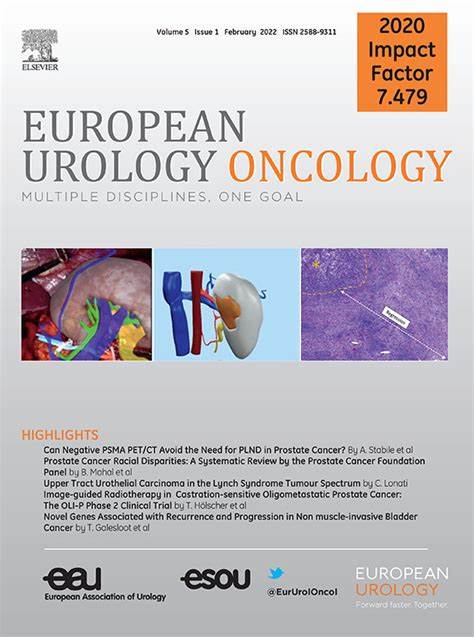通过ERG表达预测多西他赛与雄激素剥夺疗法联合治疗局部和转移性激素敏感性前列腺癌的疗效:对两项 GETUG 3 期试验的分析。
IF 9.3
1区 医学
Q1 ONCOLOGY
引用次数: 0
摘要
背景和目的:多西他赛已成为治疗晚期前列腺癌(PC)的标准药物;然而,其疗效在患者中并不普遍。一部分前列腺癌患者表现出 TMPRSS2-ERG 基因融合,导致肿瘤中 ERG 过度表达。我们的目的是评估激素敏感性PC(HSPC)男性多西他赛疗效的生物标志物:方法:我们从两项随机三期临床试验的参与者处获得了治疗前前列腺活检组织,这两项临床试验分别研究了多西他赛对高危局部PC(GETUG 12)和转移性HSPC(GETUG 15)的疗效。对 GETUG 12 样本进行了 Ki67、PTEN、RB 和磷酸化 RB 的免疫组化染色,对 GETUG 12 和 GETUG 15 样本进行了 ERG 染色。我们使用单变量和多变量分析法研究了生物标志物与预后的关系,并对其他有效的预后因素进行了调整:在 GETUG 12 患者中,Ki67 与较差的无复发生存期(RFS;危险比 [HR] 1.72;P = 0.0092)相关。两项试验的汇总分析(pinteraction = 0.056)显示,基于多西他赛的化疗可改善ERG阳性癌症患者的无复发生存期(HR 0.58;p = 0.03),但不能改善ERG阴性癌症患者的无复发生存期(HR 1.08;p = 0.72)。在 GETUG 12 的 ERG 阳性亚组(高危局部 PC)中,单用雄激素剥夺疗法(ADT)的中位 RFS 为 7.79 年,而 ADT + 多西他赛则达不到这一目标。在ERG阴性亚组中,单用ADT的中位无进展生存期(mPFS)为7.79年,而ADT+多西他赛为7.08年。在 GETUG 15 的 ERG 阳性亚组(转移性 HSPC)中,单用 ADT 的中位无进展生存期为 10.7 个月,而 ADT + 多西他赛的中位无进展生存期为 18.8 个月。在ERG阴性亚组中,单用ADT的mPFS为10.6个月,而ADT+多西他赛为13.2个月:Ki67可作为HSPC的预后因素,而ERG表达似乎可预测高危局部和转移性HSPC对多西他赛的反应。患者摘要:我们评估了可预测晚期前列腺癌患者接受多西他赛化疗后预后的因素。我们发现,一种名为ERG的蛋白质的表达可预测这些患者对多西他赛的良好反应。本文章由计算机程序翻译,如有差异,请以英文原文为准。
The Benefit of Combining Docetaxel with Androgen Deprivation Therapy in Localized and Metastatic Hormone-sensitive Prostate Cancer is Predicted by ERG Expression: An Analysis of Two GETUG Phase 3 Trials
Background and objective
Docetaxel has become a standard component of care for advanced prostate cancer (PC); however, its benefits are not universal among patients. A subset of PC cases exhibit TMPRSS2-ERG gene fusion, resulting in ERG overexpression in tumors. Our aim was to assess biomarkers for docetaxel efficacy in men with hormone-sensitive PC (HSPC).
Methods
Pretreatment prostate biopsies were obtained from participants in two randomized phase 3 clinical trials investigating docetaxel in high-risk localized PC (GETUG 12) and metastatic HSPC (GETUG 15). Immunohistochemistry staining for Ki67, PTEN, RB, and phosphorylated RB was conducted for GETUG 12 samples, and ERG staining for GETUG 12 and GETUG 15 samples. We examined biomarker association with outcomes using univariate and multivariable analyses adjusted for other validated prognostic factors.
Key findings and limitations
Among GETUG 12 patients, Ki67 was associated with a worse relapse-free survival (RFS; hazard ratio [HR] 1.72; p = 0.0092). A pooled analysis for the two trials (pinteraction = 0.056) revealed that docetaxel-based chemotherapy improved failure-free survival for patients with ERG-positive cancer (HR 0.58; p = 0.03), but not patients with ERG-negative cancer (HR 1.08; p = 0.72). In the ERG-positive subgroup in GETUG 12 (high-risk localized PC), median RFS was 7.79 yr with androgen deprivation therapy (ADT) alone, and was not reached with ADT + docetaxel. In the ERG-negative subgroup, median progression-free survival (mPFS) was 7.79 yr with ADT alone versus 7.08 yr with ADT + docetaxel. In the ERG-positive subgroup in GETUG 15 (metastatic HSPC), mPFS was 10.7 mo with ADT alone versus 18.8 mo with ADT + docetaxel. In the ERG-negative subgroup, mPFS was 10.6 mo with ADT alone versus 13.2 mo with ADT + docetaxel.
Conclusions and clinical implications
Ki67 may serve as a prognostic factor in HSPC, while ERG expression appears to predict a response to docetaxel in both high-risk localized and metastatic HSPC.
Patient summary
We assessed factors that could predict outcomes after docetaxel chemotherapy in patients with advanced prostate cancer. We found that expression of a protein called ERG can predict a good response to docetaxel in these patients.
求助全文
通过发布文献求助,成功后即可免费获取论文全文。
去求助
来源期刊

European urology oncology
Multiple-
CiteScore
15.50
自引率
2.40%
发文量
128
审稿时长
20 days
期刊介绍:
Journal Name: European Urology Oncology
Affiliation: Official Journal of the European Association of Urology
Focus:
First official publication of the EAU fully devoted to the study of genitourinary malignancies
Aims to deliver high-quality research
Content:
Includes original articles, opinion piece editorials, and invited reviews
Covers clinical, basic, and translational research
Publication Frequency: Six times a year in electronic format
 求助内容:
求助内容: 应助结果提醒方式:
应助结果提醒方式:


